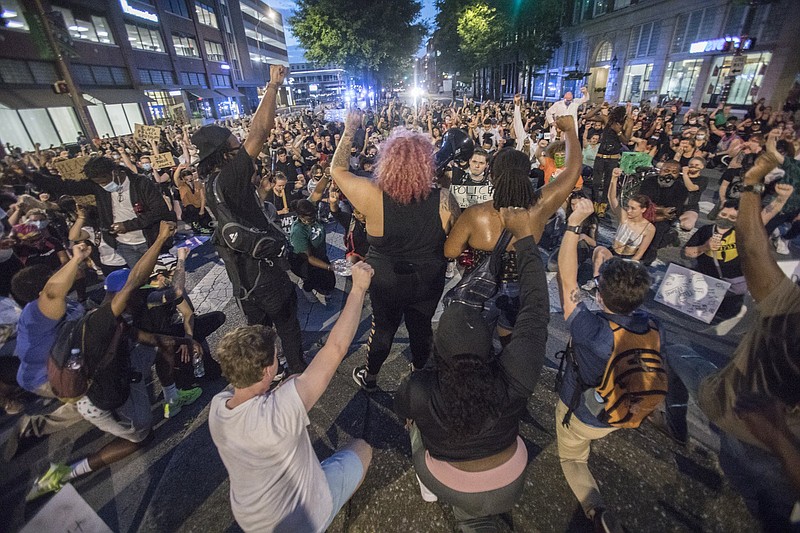Time and again over years and years, this paper has reported first one then another angry or concerned or frightened activist, citizen, teacher, preacher - occasionally even an elected official - saying, "We've got to have a conversation." Usually that needed conversation is about race and/or community violence and/or police brutality. In short, it's a needed conversation about race and injustice.
Time and again, we've heard, reported and opined on conversation about conversation. Yet too often, it remains just a platitude because even saying that much is uncomfortable. So it hasn't happened - not with any sustainability. Not until it's forced. Kind of like now.
Ask Chattanooga Police Chief David Roddy, who has been having those conversations these days in the middle of Frazier Avenue at 2:30 a.m. as community members took to the streets to demonstrate their disgust over injustice that allowed a black man in Minnesota to suffocate while a white police officer held a knee on the black man's neck for nearly nine minutes.
No, that needless death wasn't here, nor was that death the only thing that Americans and Chattanoogans, black and white, have been protesting. But that gets lost on many of us because having the whole conversation - that we're disgusted with violence and injustice of all kinds - is packed with the baggage we all bring to it about race.
On Tuesday, however, the Chattanooga City Council, in a little-attended online meeting because COVID-19 still has them social distancing, pulled the Band-aid off the wound when District 9 Councilwoman Demetrus Coonrod did what she does best: She got straight to the point and spoke from the heart.
More Info
Watch the council conversation here (beginning at about 24.5 minutes):https://tinyurl.com/ydgqkoys
After thanking Chief Roddy for denouncing the Minnesota police actions and thanking the officers who took a knee Monday with protesters, she risked the pushback she expects to get from her constituents in the black community.
"We are supposed to be 'Nooga Strong, as in a verb, action, and we're supposed to be much better than what I am seeing things being displayed in our city over the past week with different protests and everything. We are actually leaning toward more division. And we just can't take that right now. We don't need anymore division. We need to be together and united.
"But I also have to say this: ... We are losing too many black men and women due to violence from our own people, from black people. And just like I go hard to make sure that accountability is held on our police department, I am going to do the exact same thing when it comes to us displaying these same behaviors."
She was talking about black-on-black violence - really any crime - that is all too often a taboo subject and one of the most uncomfortable of our many uncomfortable conversations.
"So my call to action for everybody is that we need to hold every act of violence accountable," she continued. "I don't care if you're black or white. Every act. This is serious, people, it's not a game. ... Every day we get an email from the police department where somebody black has shot somebody black or killed somebody black. It's not acceptable. Enough is enough."
It's also personal for Coonrod. Her 4-year-old granddaughter's father was recently one of those homicide victims.
"It's going to take all of us - black people, white people, Hispanics - to make a difference. All of the people that's out here protesting, we need you voting. That's how you effectively make change."
Suddenly, conversation about conversation was alive. And in a city council meeting of all places.
Councilman Anthony Byrd, District 8, spoke up, acknowledging that he, too, knew backlash is coming. In his time on the council he's learned that the black council members "are most hated" in the black community. "If we say something, we're sell-outs. ... we're not black enough." Still, he said, "We need balance." He said he has posted on Facebook, "Tell me what justice looks like."
District 5 Councilman Russell Gilbert agreed "100%" with his colleagues: "There is too much killing of each other out there. I remember in the 60s and 40s and 30s when the KKK used to hang blacks. But they don't have to do it anymore, because we're doing it ourselves. We need to stop."
Gilbert added. "I also agree 100% we have some bad apples in our police department. Every company has bad apples. We need to focus on bad apples" not the whole of police, "And we need to make changes so people can feel free and safe walking down the street."
Councilman Erskine Oglesby, District 7, added: "What we're experiencing as African Americans is a test of our humanity. ... [Protesters,] continue to express yourself, but not with violence or vandalism. Don't lose sight of the goal, and the violence and vandalism takes away from that. ... All nine of us [on the council, black and white] are here for betterment of our community."
Council Chairman Chip Henderson, District 1, and other council members asked Chief Roddy what the city and police department need now.
Keep having conversations, was Roddy's answer.
"In the middle of Frazier [Avenue], a gentleman asked me what have you done to bring about change. ... My response was 'nothing.' You don't want me to do that by myself. I can design all the solutions in the world, but if the people most affected aren't part of that solution, then I've failed it. ... I can fix all the burnt out streetlights I want, but if I don't get the one over your house you could care less about the other 10. ... That's the conversations we need to be having."
Perhaps those conversations, finally, have begun.
